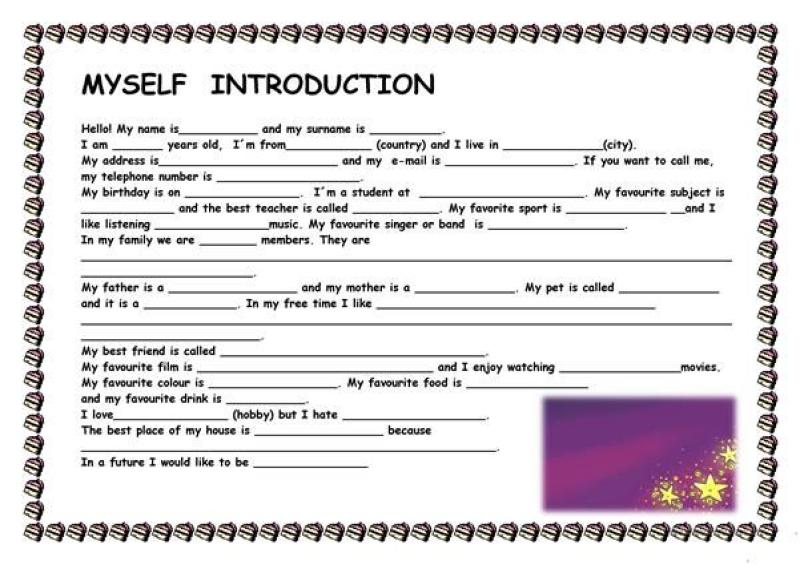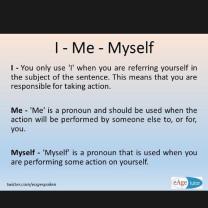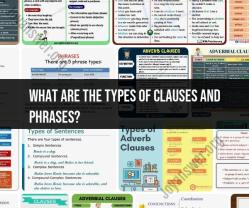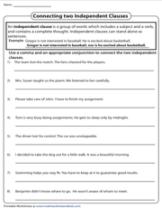How do I use myself?
"Myself" is a reflexive pronoun, and its usage is often misunderstood. Here are some guidelines on how to use "myself" correctly:
1. Reflexive Pronoun:
- "Myself" is a reflexive pronoun that should be used when the subject and the object of the sentence are the same person.
- Correct: I will introduce myself to the team.
- Incorrect: I will introduce John and myself to the team.
2. Emphasizing Pronoun:
- "Myself" can also be used as an emphasizing pronoun, especially when you want to add emphasis to the pronoun in a sentence.
- Correct: I, myself, am responsible for the mistake.
- Incorrect: Myself am responsible for the mistake.
3. Avoid Unnecessary Use:
- Avoid using "myself" when the sentence doesn't require a reflexive pronoun or an emphasizing pronoun.
- Correct: I enjoyed the movie.
- Incorrect: Myself enjoyed the movie.
4. After "And" or "Or":
- Use "myself" after "and" or "or" only when you are both the subject and the object in the same clause.
- Correct: John and I introduced ourselves to the team.
- Incorrect: John and myself introduced ourselves to the team.
5. Prepositions:
- Use "myself" after certain prepositions when you are both the subject and the object in the sentence.
- Correct: I did it by myself.
- Incorrect: I did it with John and myself.
6. Not a Substitute for "I" or "Me":
- Don't use "myself" as a substitute for "I" or "me" in a sentence.
- Correct: John and I went to the store.
- Incorrect: John and myself went to the store.
7. Use in Formal Writing:
- In formal writing, especially business or academic contexts, "myself" may be used to maintain a formal tone.
- Correct: Please direct any questions to John or myself.
- Informal: Please direct any questions to John or me.
8. Be Clear and Concise:
- Use "myself" when it adds clarity or emphasis to the sentence, but avoid using it excessively or inappropriately.
9. Correct Examples:
- I will do it myself.
- I treated myself to a spa day.
- She and I found ourselves lost in the city.
10. Incorrect Examples:
- John and myself are working on the project.
- Myself will be attending the meeting.
- The package is for John and myself.
Remember that correct usage of pronouns contributes to clear and effective communication. Pay attention to the role of the pronoun in the sentence and use "myself" appropriately to convey your intended meaning.
In what context should one use the reflexive pronoun "myself"?
Here are the main contexts where you should use the reflexive pronoun "myself":
1. When the subject and object of the verb refer to the same person:
This is the most common use of reflexive pronouns. The pronoun "myself" emphasizes that the action is being done by and to the same person.
- Example: I cut myself while I was cooking dinner.
- Example: I locked the door myself to make sure it was secure.
- Example: I treated myself to a massage after a long week.
2. To add emphasis or clarify the subject:
"Myself" can be used to add emphasis to the subject, especially when it's important to distinguish the subject from other possible subjects.
- Example: I myself saw the UFO fly overhead. (This emphasizes that you saw it and not someone else.)
- Example: I did the work myself, without any help. (This clarifies that you did the work alone.)
3. After prepositions:
"Myself" is often used after prepositions such as "by," "with," "for," "to," and "on."
- Example: I bought the book for myself.
- Example: I made the decision by myself.
- Example: I was talking to myself in the mirror.
4. In idiomatic expressions:
"Myself" can be found in several idiomatic expressions like "beside myself," "come to myself," and "be myself."
- Example: I was beside myself with worry when I lost my phone.
- Example: It took a while for me to come to myself after the accident.
- Example: I just want to be myself around you.
5. To avoid ambiguity:
In some cases, using "myself" can help avoid ambiguity and make the sentence clearer.
- Example: She told me to take care of myself. (This is clearer than "She told me to take care of".)
- Example: I hurt myself when I fell. (This is clearer than "I hurt".)
Here are some additional points to keep in mind:
- Do not use "myself" as the subject of a sentence. Use "I" instead.
- Do not use "myself" after the verb "to be." Use "myself" only after verbs that take an object.
- Avoid using "myself" excessively, as it can sound awkward and unnatural.
By understanding the different contexts in which "myself" is used, you can ensure that you are using it correctly and effectively in your writing and speech.













